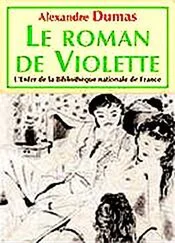Alexandre Dumas - The Hero of the People - A Historical Romance of Love, Liberty and Loyalty
Здесь есть возможность читать онлайн «Alexandre Dumas - The Hero of the People - A Historical Romance of Love, Liberty and Loyalty» — ознакомительный отрывок электронной книги совершенно бесплатно, а после прочтения отрывка купить полную версию. В некоторых случаях можно слушать аудио, скачать через торрент в формате fb2 и присутствует краткое содержание. Жанр: foreign_antique, foreign_prose, Историческая проза, на английском языке. Описание произведения, (предисловие) а так же отзывы посетителей доступны на портале библиотеки ЛибКат.
- Название:The Hero of the People: A Historical Romance of Love, Liberty and Loyalty
- Автор:
- Жанр:
- Год:неизвестен
- ISBN:нет данных
- Рейтинг книги:5 / 5. Голосов: 1
-
Избранное:Добавить в избранное
- Отзывы:
-
Ваша оценка:
- 100
- 1
- 2
- 3
- 4
- 5
The Hero of the People: A Historical Romance of Love, Liberty and Loyalty: краткое содержание, описание и аннотация
Предлагаем к чтению аннотацию, описание, краткое содержание или предисловие (зависит от того, что написал сам автор книги «The Hero of the People: A Historical Romance of Love, Liberty and Loyalty»). Если вы не нашли необходимую информацию о книге — напишите в комментариях, мы постараемся отыскать её.
The Hero of the People: A Historical Romance of Love, Liberty and Loyalty — читать онлайн ознакомительный отрывок
Ниже представлен текст книги, разбитый по страницам. Система сохранения места последней прочитанной страницы, позволяет с удобством читать онлайн бесплатно книгу «The Hero of the People: A Historical Romance of Love, Liberty and Loyalty», без необходимости каждый раз заново искать на чём Вы остановились. Поставьте закладку, и сможете в любой момент перейти на страницу, на которой закончили чтение.
Интервал:
Закладка:
“Out of this house,” she gasped, almost losing her voice while she tried to pulverize him with her gaze.
Pitou remarked with satisfaction that he could not have swallowed one grain more of rice.
“Aunt, you are a bad relative,” he said loftily. “I wanted you to show yourself as of old, spiteful and avaricious. But I am not going to have it said that I eat my way without paying.”
He stood on the threshold and called out with a voice which was not only heard by the starers without but by anybody within five hundred paces:
“I call these honest folk for witnesses, that I have come from Paris afoot, after having taken the Bastile. I was hungered and tired, and I have sat down under my only relation’s roof, and eaten, but my keep is thrown up at me, and I am driven away pitilessly!”
He infused so much pathos in this exordium that the hearers began to murmur against the old maid.
“I want you to bear witness that she is turning from her door a poor wayfarer who has tramped nineteen leagues afoot; an honest lad, honored with the trust of Farmer Billet and Dr. Gilbert; who has brought Master Sebastian Gilbert here to Father Fortier’s; a conqueror of the Bastile, a friend of Mayor Bailly and General Lafayette.”
The murmuring increased.
“And I am not a beggar,” he pursued, “for when I am accused of having a bite of bread, I am ready to meet the score, as proof of which I plank down this silver bit – in payment of what I have eaten at my own folk’s.”
He drew a silver crown from his pocket with a flourish, and tossed it on the table under the eyes of all, whence it bounced into the dish and buried itself in the rice. This last act finished the mercenary aunt; she hung her head under the universal reprobation displayed in a prolonged groan. Twenty arms were opened towards Pitou, who went forth, shaking the dust off his brogans, and disappeared, escorted by a mob eager to offer hospitality to a captor of the Bastile, and boon-companion of General Lafayette.
CHAPTER VII
THE ABDICATION IN A FARMHOUSE
AFTER having appeased the duties of obedience, Pitou wished to satisfy the cravings of his heart. It is sweet to obey when the order chimes in with one’s secret sympathies.
Ange Pitou was in love with Catherine, daughter of farmer Billet who had succored him when he fled from his aunt’s and with whom he had taken the trip to Paris which returned him a full-fledged hero to his fellow-villagers.
When he perceived the long ridge of the farmhouse roofs, measured the aged elms which twisted to stand the higher over the smoking chimneys, when he heard the distant lowing of the cattle, the barking of the watchdogs, and the rumbling of the farm carts, he shook his casque on his head to tighten its hold, hung the calvary sabre more firmly by his side, and tried to give himself the bold swagger of a lover and a soldier. As nobody recognized him at the first it was a proof that he had fairly succeeded.
The farmhands responded to his hail by taking off their caps or pulling their forelocks.
Through the dininghall window pane Mother Billet saw the military visitor. She was a comely, kind old soul who fed her employes like fighting cocks. She was, like other housewives, on the alert, as there was talk of armed robbers being about the country. They cut the woods down and reaped the green corn. What did this warrior’s appearance signify? attack or assistance?
She was perplexed by the clodhopper shoes beneath a helmet so shining and her supposition fluctuated between suspicion and hope.
She took a couple of steps towards the new-comer as he strode into the kitchen, and he took off his headpiece not to be outdone in politeness.
“Ange Pitou?” she ejaculated. “Whoever would have guessed that you would enlist.”
“Enlist indeed?” sneered Pitou, smiling loftily.
As he looked round him, seeking someone, Mistress Billet smiled, divining who he was after.
“Looking for Catherine?” she asked unaffectedly.
“To present her with my duty,” said Pitou.
“She is ironing,” responded Mrs. Billet; “but sit ye down and talk to me.”
“Quite willing, mother.” And he took a chair.
In all the doorways and windows the servants and laboring men flocked to see their old fellow. He had a kindly glance for them all, a caress in his smile for the most part.
“So you come from town, Ange?” began Mother Billet. “How did you leave the master?”
“He is all right, but Paris is all wrong.”
The circle of listeners drew in closer.
“What about the King?” inquired the mistress.
Pitou shook his head and clacked his tongue in a way humiliating to the head of the monarchy.
“And the Queen?”
Pitou said never a word.
“Oh,” groaned the crowd.
Pitou was aching for Catherine’s coming.
“Why are you wearing a helmet?”
“It is a trophy of war,” rejoined the young peasant. “A trophy is a tangible testimonial that you have vanquished an enemy.”
“Have you vanquished an enemy, Pitou?”
“An enemy – pooh!” said the valiant one, disdainfully. “Ah, good Mother Billet, you do not know that Farmer Billet and yours truly took the Bastile between us.”
This speech electrified the auditory. Pitou felt the breath on his hair and the helmet mane, while their hands grasped the back of his chair.
“Do tell us what our master has done,” pleaded Mrs. Billet, proud and tremulous at the same time.
Pitou was hurt that Catherine did not leave her linen to come and hear such a messenger as he was. He shook his head for he was growing discontented.
“It will take a time,” he observed.
“Are you hungry, or thirsty?”
“I am not saying no.”
Instantly all the men and maids bustled about so that Pitou found under his hand goblets, mugs, bread, meat, cheese, without realizing the extent of his hint. He had a hot liver, as the rustics say: that is, he digested quickly. But he had not shaken down the Angelican fowl in rice; he tried to eat again but had to give up at the second mouthful.
“If I begin now,” he said, “I should have to do it all over again when Miss Catherine comes.”
While they were all hunting after the young girl, Pitou happened to look up and saw the girl in question leaning out of a window on the upper landing. She was gazing towards Boursonne Woods.
“Oh,” he sighed, “she is looking towards the manor of the Charnys. She is in love with Master Isidor Charny, that is what it is.”
He sighed again, much more lamentably than before.
Taking the farmer’s wife by the hand as the searchers returned fruitless in their search, he took her up a couple of the stairs and showed her the girl, mooning on the window sill among the morning glories and vines.
“Catherine!” she called: “Come, Catherine, here is Ange Pitou, with news from town.”
“Ah,” said Catherine coldly.
So coldly that Pitou’s heart failed him as he anxiously waited for her reply.
She came down the stairs with the phlegm of the Flemish girls in the old Dutch paintings.
“Yes, it is he,” she said, when on the floor.
Pitou bowed, red and trembling.
“He’s wearing a soldier’s helmet,” said a servant-woman in her young mistress’s ear.
Pitou overheard and watched for the effect. But her somewhat pallid though evercharming face showed no admiration for the brazen cap.
“What is he wearing that thing for?” she inquired.
This time indignation got the upperhand in the peasant.
“I am wearing helmet and sabre,” he retorted proudly, “because I have been fighting and have killed Swiss and dragoons: and if you doubt me, Miss Catherine, you can ask your father, and that is all.”
Читать дальшеИнтервал:
Закладка:
Похожие книги на «The Hero of the People: A Historical Romance of Love, Liberty and Loyalty»
Представляем Вашему вниманию похожие книги на «The Hero of the People: A Historical Romance of Love, Liberty and Loyalty» списком для выбора. Мы отобрали схожую по названию и смыслу литературу в надежде предоставить читателям больше вариантов отыскать новые, интересные, ещё непрочитанные произведения.
Обсуждение, отзывы о книге «The Hero of the People: A Historical Romance of Love, Liberty and Loyalty» и просто собственные мнения читателей. Оставьте ваши комментарии, напишите, что Вы думаете о произведении, его смысле или главных героях. Укажите что конкретно понравилось, а что нет, и почему Вы так считаете.












